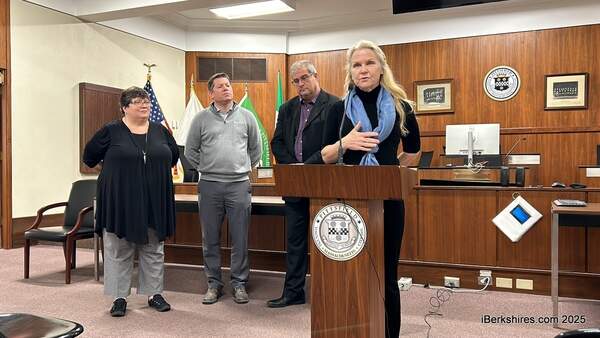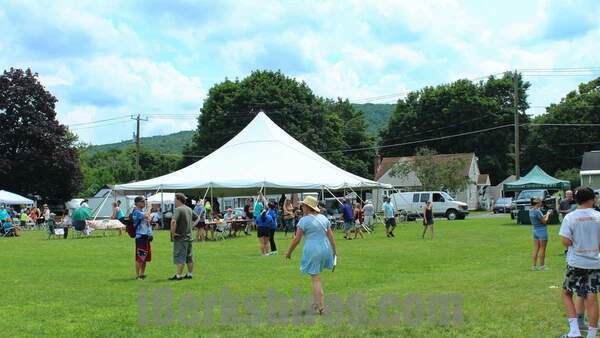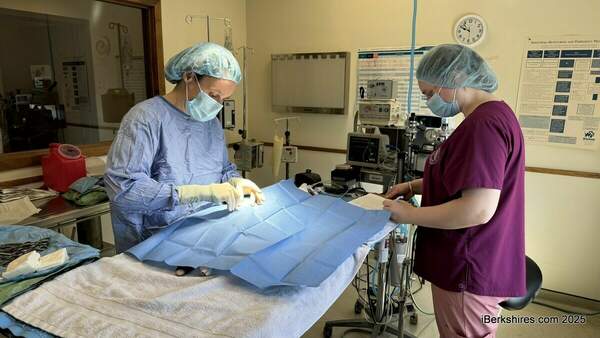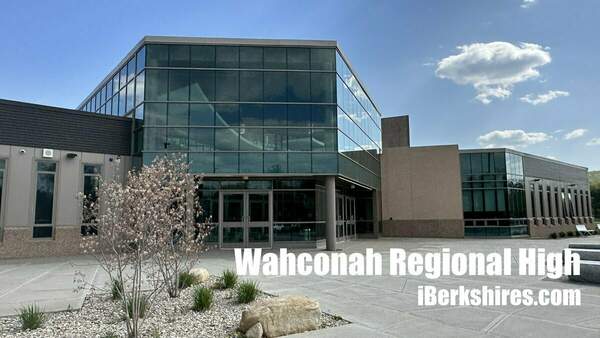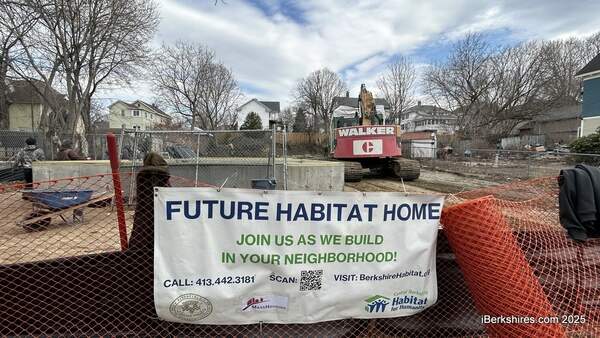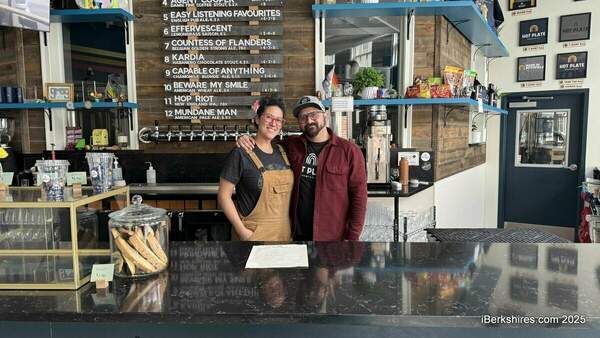MCLA, BCC to Host Sixth Natural History Conference Oct. 1
PITTSFIELD, Mass. — The Sixth Annual Berkshire Natural History Conference, featuring presentations by local and regional naturalists and acclaimed authors, will take place on Saturday, Oct. 1 from 9 a.m. to 3:30 pm at Massachusetts College of Liberal Arts, located at 375 Church Street in North Adams, Massachusetts.
Highlighting topics that range from rare birds to tiny organisms that live within the layers of a leaf, the event includes several renowned speakers and exhibitors. It is open to the public, and students of all ages and disciplines are especially encouraged to attend. General admission tickets are $25; student tickets are $15 and include forum credit. To purchase tickets, visit www.berkshirecc.edu/bnhc or call (413) 236-2127.
"This event brings natural history home to the Berkshires," said Berkshire Community College Professor of Environmental Science Tom Tyning, a lead organizer of the event. "We are excited to gather programs and like-minded people together to help understand and appreciate the deep natural heritage that surrounds us."
Schedule of Events
9 a.m.: Welcome and announcements with MCLA President James F. Birge and MCLA Professor of Environmental Studies Elena Traister
9:20 a.m.: Heather Bruegl, "The Land is Living." To Indigenous peoples, the land is more than just land. It is a living and breathing entity, and it is part of us. Learn what the land means to Indigenous peoples, as well as how they are fighting to keep it protected and have it returned.
9:50 a.m.: Brian Hawthorne, "Massachusetts BioMap 3: Land Protection, Habitat Restoration, Climate Resilience." To protect our rich natural heritage of animals, plants and habitats in the face of land development, pollution, climate change and other threats, it is essential that we continue to strategically protect, restore and manage these invaluable treasures. The new web-based BioMap progra.m. envisions a future that allows the full complement of Massachusetts plants, animals and habitats to survive and flourish alongside people who have a.m.ple access to nature and outdoor recreation, all while ensuring a climate-resilient landscape. Learn how BioMap’s features, including an interactive map and habitat restoration resource center, can help ensure a robust, healthy future for us all.
10:10 a.m.: Jonathan Pierce, "The Rare Birds of Berkshire County." This talk is a summary of some of the rarest of the rare birds that have been found in the Berkshires within the past few years. Jonathan will highlight some of the stories of these rare birds, how to look for rare birds on your own, and the best way to document a sighting.
10:30 a.m.: Break. Visit exhibits, take a natural history quiz and bid on silent auction items.
10:55 a.m.: Noah Siegel, "An Introduction to the Mushrooms of Western Mass." Edible, or non-edible? These are only two items of interest in the fungi that blanket the hills and valleys of Berkshire County.
11:10 a.m.: Matt Kelly, "A History of Natural History Writing: The S. Waldo Bailey Journals 1902 – 1963." Matt tells the story about the fascinating life of one of New England’s great natural history observers as he delves into sa.m.ples of S. Waldo Bailey’s observations and nature writing. Bailey was not only an extraordinarily keen observer of nature, but he also meticulously recorded his prodigious observations with wonderful prose. His best years were here in Berkshire County.
11:25 a.m.: Tom Tyning, "Bailey’s Unknown Salamander." As understanding of climate change increases, attention has been focused on both terrestrial and aquatic ecological communities. Not surprisingly, a fair amount of research has concerned itself with economically important species. At the last Berkshire Natural History Conference, Williams College Assistant Biology Professor Ron Bassar pointed out potential threats to our native brook trout. Within a few weeks of that meeting, Tom came across a passage from S. Waldo Bailey describing a salamander he had never seen before in Windsor, and he wondered if it was still there. Find out what he learned.
12:00 pm: Lunch buffet in the Campus Center Gymnasium
1:30 pm: Reminders and announcements
1:35 pm: Vivian Orlowski, "Operation Pollination: Creating Community Partnerships for Pollinator Protection" (via Zoom). This is an opportunity to support pollinators in the region. By acting together to cooperatively conserve our ecological heritage, we can protect pollinator health and habitat, which is so critical for regional food and ecosystems.
2:00 pm: Ben Nickley, "The Berkshire Bird Observatory: Origins, Current Projects and Tales from the Field." Ben will discuss the Berkshire Bird Observatory’s origins, aims, current research projects and future endeavors. He will also show many beautiful pictures of birds in hands and relate stories from the pilot spring, summer and fall seasons at Jug End State Reservation in Egremont, Massachusetts.
2:20 pm: Zach Adams, "Nocturnal Flight Calls." Nocturnal flight calls are an intricate part of bird migration that is as much a phenomenon as a kettle of broad-winged hawks or a swarm of nighthawks, but it occurs when most of us are sleeping. The reality of migration for songbirds is that they are mostly migrating at night where their brain activity drops, and they are just flying and making subtle calls. These calls are often just "zips" or "pips," but with a little patience you can hear some incredible sounds that are distinct and identifiable. Zach will share tips and tricks to making the most of nocturnal flight calls as well as introduce a few prominent calls that are great ways to get started experiencing birds at night and understanding what birds are flying over the Berkshires.
2:45 pm: Kyle Bradford, "Ants in Pine Barrens of Western Massachusetts." Pine barrens and other dry, disturbance-dependent natural communities provide habitat for many rare and threatened wildlife, including ants. However, the ant fauna of inland Massachusetts barrens is not well documented. In 2020, Kyle and co-authors Michael Akresh and Chris Buelow sa.m.pled 18 barrens sites, including three in Berkshire County, to document ant diversity and better understand the effects of management, vegetation structure, and other biotic factors on ant diversity and abundance. This talk will discuss what they learned about the ant fauna in Berkshire County and their findings and management implications for inland Massachusetts barrens.
3:05 pm: Rene Wendell, "Early Detection of Exotic Invasives – What’s Next?" Rene will take a look at a few of the recent invasive species to Berkshire County. With first-hand experience with all of these species, Rene will discuss their identification, habitat preferences and why it’s important to be on the lookout for them.
3:30 pm: Silent auction winners announced
Sponsors of the Berkshire Natural History Conference include Berkshire Community College, Massachusetts College of Liberal Arts, Green Berkshires, Inc., Orion magazine, Berkshire Environmental Action Tea.m., Hoosic River Watershed Association, Willia.m.s College Center for Environmental Studies, Massachusetts Audubon Berkshire Sanctuaries and Hoffmann Bird Club.
Tags: BCC, MCLA, natural history,

